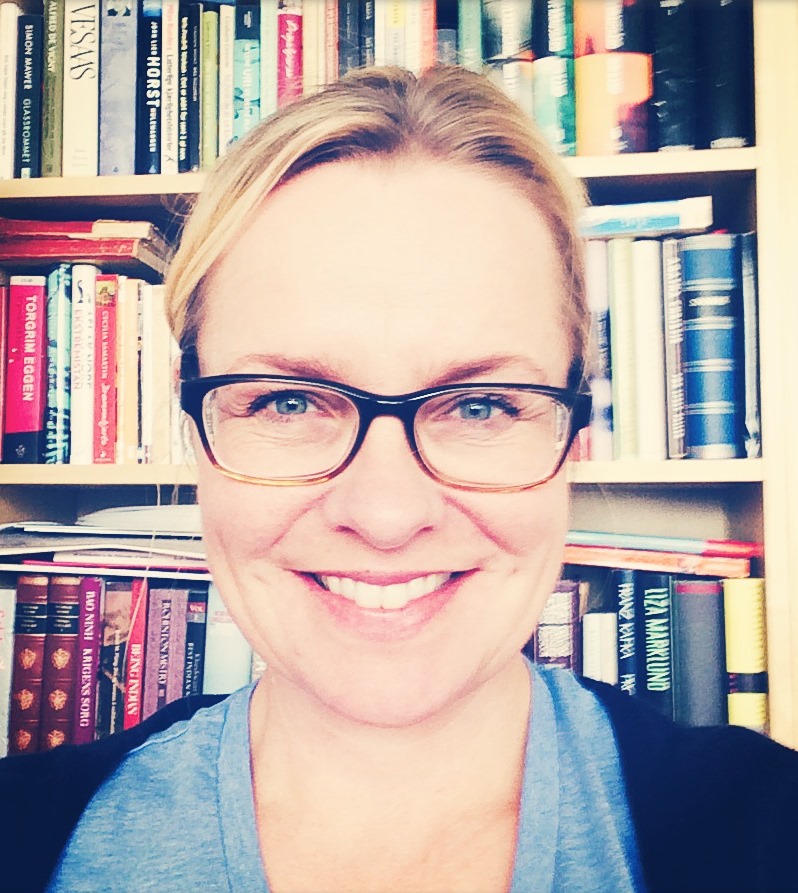From humanities scholar to IT dean
She is future oriented in her work to bring diversity and change to the IT field, but Oda Award winner Beathe Due thinks it is just as important to be aware of the past when working for change. “It’s worth remembering that information technology has not always been a man’s field,” says Due.
When Beathe Due received the Oda Award in 2014, she was known for her proactive efforts to disseminate knowledge about IT to young people, as well as to shine the spotlight on those women who already work in the IT field.
“We should not underestimate the impact of role models,” says Due.
“Before the mid-1980s, there were about the same number of women and men who studied IT, and some environments consisted entirely of female programmers. If you look outside of the Western cultural sphere, IT subjects are just as popular among girls and women. In no way is IT a man’s field.”
“We are still at a place in the technology field where women must prove and demonstrate that this is something they can do as a matter of course, and in this way we inspire those who follow in our footsteps,” she continues.

“Programming is creative”
Due is dean of the Faculty of Computer Sciences at Østfold University College. She is also one of the founders of Oslo’s version of the worldwide “Girl Geek Dinner” phenomenon – an open network where women interested in technology can meet like-minded professionals.
In addition, she is the driving force behind the Norwegian movement known as “Teach kids coding”, which seeks to inspire children to become creators of technology by teaching them the principles of programming at a young age in a world that is becoming more and more digitalized.
“‘Teach kids coding’ is a very important movement,” says Due.
“I think it’s crucial that children learn early on what coding and programming is all about, and that everything we do with computers is created by people. It’s not dry and boring like many believe – on the contrary, it’s innovative, creative and exciting,” she explains.
“Moreover, it entails more than just recruitment to the IT field. The way society is developing, it’s important to focus on digital competency in general, allow children to become familiar with it early on, and quite simply make it a part of general education.”
Early intervention to remove gender stereotypes
Another advantage of allowing children to learn programming at an early age is that it helps to break down the gender stereotypes that the field is burdened with now, according to Due.
“Some people have aired the idea of having separate coding classes for girls when we teach children about programming, called ‘coding for girls’. I don’t think that would be beneficial,” she says.
“What we actually achieve by allowing children to explore this field at such a young age is that we get the chance to eliminate the gender stereotypes that we adults often have.”
“We see something else clearly as well: It’s not actually true that all boys want to use coding to create war games. Many boys like to use coding for other kinds of storytelling, and many girls want to create action-packed games,” explains Due.
“It’s another matter for us ‘old folks’ in the field now, who still need each other and can benefit a lot from women’s networks, sharing experiences and the like. But we must spare the very young from the gender stereotypes we inflict on them when it is precisely those stereotypes we are working to shake off ourselves.”
Before IT became a man’s subject
Beathe Due has paid her dues in the male-dominated technology field. She holds an ICT-related doctoral degree and worked for many years at Norway’s technology stronghold Telenor before re-entering academia and becoming dean of an IT faculty. It may be surprising, then, that she primarily took humanities courses at the University of Oslo and earned a master’s degree in the history of ideas.
Due herself, though, does not think this is paradoxical at all.
“When I began my grunnfag (one-year foundation level subject) in the history of ideas, I was immediately captivated and thought it was an incredibly exciting subject, especially the approach that underlies the entire history of ideas as a subject – that nothing is a given, that there are no laws of nature dictating why culture is the way it is,” she says.
“It’s especially interesting to view technology from a historical perspective. For example, I think many people still believe that the IT field was founded by the stereotypical, self-taught young geek in his bedroom and that this rather common perception explains why the field is still so male dominated – that is, it is only right now that male dominance of the field is beginning to loosen up.”
“But this is a partial truth, to put it mildly. Before the 1980s, there were about the same number of women as men who studied IT,” says Due.
Around the mid-1980s the percentage of women studying computer science began to decline, and nobody knows exactly why this happened. A post titled “When Women Stopped Coding” on the US blog and podcast website Planet Money suggests that the decline corresponds with the time when personal computers started becoming common in US homes around 1984. These early personal computers served mainly as toys – and were marketed to boys and men from the start.
“This may absolutely be a reason, especially if you consider that this was just before the marketing of toys became so extremely gender oriented like it is today. Even diapers in the 1990s were divided into pink and blue, and in shops today we find ‘girls’’ and ‘boys’’ cookbooks. I think the small things children and teenagers encounter in their daily lives reinforce these perceptions even more,” says Due.
“When we apply a historical perspective to phenomena we are familiar with, we also get to tell the other versions of history – the less dominant ones – but the ones that challenge the prevailing view of how things are. It has not always been the case that girls and women are not interested in technology studies. In fact there are many who do choose to study technology. We should not forget that the person who wrote the first programming language in the 1800s, Ada Lovelace, was a woman,” she points out.
The encounter between technology and humans
Due herself grew up in a home with a Commodore 64 and her father had a great interest in computers. She often sat next to her father, who introduced her to coding – and she thought it was terribly boring, as it involved a lot of figures on a dark, uninviting screen. However, as a young student of the history of ideas, she began to develop an interest in technology when she studied a lot of technology philosophy and began to connect this with Hannah Arendt’s theory of action.
“I think this awakened an interest that had been dormant ever since my childhood,” says Due.
The result was a final thesis in the history of ideas that discussed expectations about the use of mobile phones, including a review of newspaper articles from the 1920s and 1930s when telephones were new and women’s use of them was described as “a source of meaningless drivel”.
“There was a campaign against women and how they used the telephone in the ‘wrong’ way, for talking nonsense and silly laughter. The perceived problem was that women were occupying the phone booths when men needed to make important business calls. There was even a specific association for men who wanted women to talk less on the telephone,” says Due.
“And when mobile phones became commonly owned in the 1990s, there was a similar campaign against teenagers as a group because they used mobile phones in a different way than intended,” she says.
“Text messaging, which was originally meant to be used to send telegram-like messages at work, such as ‘meeting postponed until 2 pm’ and the like, was used by teenagers to converse and exchange poems, jokes and other communication.”
It is precisely this unpredictability in the encounter between technology, people and culture that is very exciting to study, Due believes.
“We incorporate so many preconceptions about people and about the world in the technology we create. We have an idea about what a piece of technology should entail, then we introduce it to living, acting people, and it is often used in completely different ways than intended.”
“Focus on diversity and stop dividing everything up by gender”
After completing a master’s degree, Due began her doctoral studies at the Department of Media and Communication at the University of Oslo, where she wrote her thesis on digital media, ICT strategies and local politics. She then worked for six years as a researcher in Telenor’s research division before coming dean of the Faculty of Computer Sciences at Østfold University College in 2013.
“I’m so pleased to be able to work with bringing a higher profile to IT studies and digital competence, and to try to encourage more girls and women to study IT subjects,” she says.
Because of her many years as a technology devotee, Due quickly got on board when Bente Kalsnes took the initiative to establish “Girl Geek Dinners” in Oslo.
“It’s been fantastic for me to meet other women to talk about our profession. In our generation we still find that men play the leadership role and are present everywhere, so it’s been liberating to meet other women in a professional technology context.”
“It’s also grown dramatically, so there has obviously been a need. As of today we have over 1,000 members, and we’re getting many new members all the time.”
Although Due is clear that there is a need for both female role models and networks in the IT field, she also wants to see adults take responsibility for eliminating gender stereotypes in IT subjects for the coming generations.
“We need to focus on diversity and stop dividing everything up by gender. There are so many factors other than gender that determine who you are and why you’re interested in IT, and in the long run I hope the gender dimension will disappear entirely from the field,” she says.
Due emphasizes that she is optimistic:
“I’m sure that more and more girls and women will discover IT and that gender will become less and less of a factor,” she says.
“The coolest thing would be if we felt it was time to discontinue the ‘Girl Geek Dinners’. The day we do that, we have achieved our goal.”
Translated by Connie Stultz.
Beathe Due has a master’s degree in the history of ideas and a doctoral degree from the Department of Media and Communication at the University of Oslo. She is currently the dean of the Faculty of Computer Sciences at Østfold University College. She is also the driving force behind the movement “Teach kids coding”.
Beathe Due received the Oda Award for 2014.
The Oda Award is presented by the Oda Network, the Nordic region’s largest meeting place for women who work with IT or in the IT field. The award has been presented annually since 2009. The objective of the award is to promote and bring attention to female role models in the IT field.


